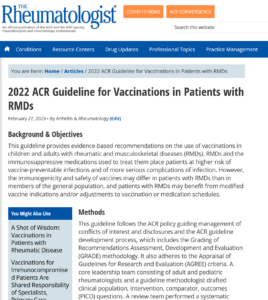Dr. Bass points out the evidence base for these specific periods in different agents is weak, and shorter hold times may be indicated in patients at risk of severe flare.
A key group to consider is very young children with severe autoinflammatory diseases or systemic juvenile idiopathic arthritis (JIA) taking interleukin (IL) 1 blockers, or similar treatment, who have not completed their primary vaccination schedule (e.g., with the live measles, mumps and rubella vaccine). “The risk of vaccine-induced illness is much greater with first exposure,” says Dr. Bass. “That’s a small population, but it’s an important one for rheumatologists because they are often the sickest kids.”
The guideline conditionally recommends that infants exposed to tumor necrosis factor (TNF) inhibitors in utero receive the live rotavirus vaccine within the first six months of life, in line with standard recommendations for infants. This contrasts with current recommendations from the American Academy of Pediatrics, which default to holding the vaccine for a year following exposure.

Click here to read an excerpt from an article on the guideline published by Arthritis & Rheumatology.
Dr. Bass notes that we do have some experience with children exposed to TNF inhibitors in utero who have not experienced clear adverse events, and TNF inhibitors are one of the only biologics that rheumatologists generally continue during pregnancy. “The pediatricians we collaborated with really were very happy with [this recommendation],” says Dr. Bass.
In contrast, for children of mothers who received rituximab during the second or third trimester of pregnancy, the conditional recommendation is to delay the first rotavirus vaccination until the baby is at least six months old, to promote better safety and immunogenicity.
Dr. Bass notes that rheumatologists seeing pregnant or pediatric patients should proactively discuss these topics, either with the parents or directly with the child’s pediatrician. As always, shared decision making and clear communication with patients are critical, especially because the evidence for many of these recommendations is weak.
Providers can play a key leadership role in helping their patients get the protection they need. “Pediatricians are really under siege with the anti-vaccination movement,” says Dr. Onel. “We need to be as supportive to them as we can.”
 Ruth Jessen Hickman, MD, is a graduate of the Indiana University School of Medicine. She is a freelance medical and science writer living in Bloomington, Ind.
Ruth Jessen Hickman, MD, is a graduate of the Indiana University School of Medicine. She is a freelance medical and science writer living in Bloomington, Ind.



